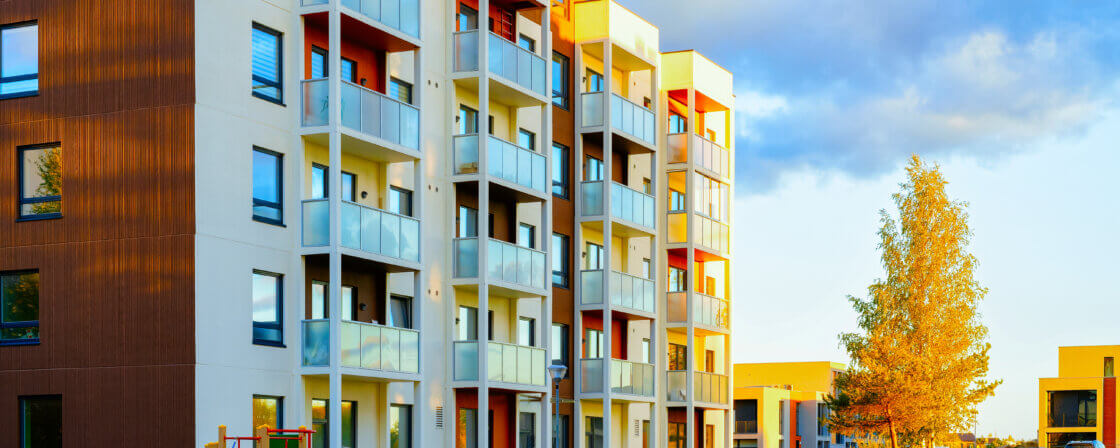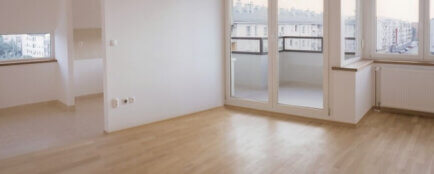Property prices often raise eyebrows even among experienced buyers. Two flats of the same size, both 2+1, both with balconies, and yet one costs a million more. What’s behind this? The market value of a property is not random, it is the result of a combination of many variables that together create the final price.
Therefore, sellers and buyers need to navigate not only the price comparison books, but more importantly, what actually affects the price of a property. It is not just about how much one wishes to get for an apartment or house, but also about what the market is realistically willing to pay.
Location as a key factor
If we had to pick one thing that fundamentally influences property prices, it is undoubtedly location. It’s not just the city, the specific address, the neighbourhood, but also the street itself is crucial. While flats in the centre of Prague commonly sell for 150,000 CZK/m² or more, the same standard in the outskirts or smaller towns can cost less than half that.
The location reflects the availability of services, amenities, transport links, safety and the overall impression of the place. Having an apartment 5 minutes from the subway is in a completely different league from living in a neighborhood where the bus goes once an hour. Similarly, a view of a park has a different value than a view of a busy road.
Apartment prices are also influenced by whether a location is developing (development projects, new schools, shopping centers) or stagnating. Prestige also plays a big role; a street in a residential residential area will have a different value than a prefabricated housing estate with a worse reputation.
The locality therefore forms the basic skeleton on which everything else is built. Even the most luxurious apartment will sell poorly if it is in the wrong part of town.
Are you solving a similar problem?
Are you planning to buy or sell a property?
Get advice from experienced lawyers specialising in real estate. We will ensure a safe transfer, check the legal status and help you avoid unnecessary complications. Contact us for a consultation today.
More information
- When you order, you know what you will get and how much it will cost.
- We handle everything online or in person at one of our 6 offices.
- We handle 8 out of 10 requests within 2 working days.
- We have specialists for every field of law.
Type of property and its purpose
Another factor influencing property prices is the type and purpose of the property. There is no such thing as an apartment, just as there is no such thing as a house. The market value varies considerably depending on whether it is a classic prefabricated apartment, a duplex in the city centre, a family house in the countryside or a holiday cottage.
Apartments are generally more expensive per square metre than houses because they are often located in city centres where there is higher demand and less space. In the case of houses, the size of the plot, the type of development and the accessibility of the city play a big role.
Another difference is the purpose of the property. Prices for apartments intended for permanent housing may differ from those bought for investment (for example, short-term rentals). For investment flats, the expected return is also taken into account.
The layout is another piece of the puzzle. Small flats (1+kk, 2+kk) tend to be more expensive per m² because they are attractive for individuals and investors. On the other hand, large 4+1 flats can be cheaper on a per sqm basis because they are sought after by a smaller group of buyers.
Technical condition and age of the property
When two people buy an identical flat but one completely renovates it and the other leaves it in its original condition, the price difference can be hundreds of thousands of euros. After location, the technical condition is the second most important element that influences property prices.
Age plays a significant role. Newly built or recently renovated apartments are logically more expensive than those awaiting complete reconstruction. Older properties may have problems with wiring, poor insulation, substandard windows, outdated heating, or even structural issues.
What renovations have been done and how well they have been done is also crucial. Cheap renovations made with poor quality materials can end up driving down the price rather than increasing it. The buyer today is informed and demands PENB, revisions, documentation and often has the property technically inspected.
If the apartment needs to be completely redesigned, this reduces the purchase price by the cost of repairs and also by the inconvenience. Conversely, newly renovated apartments with quality workmanship and modern standards sell faster and at a higher price.
Tip for article
Tip: Buying a co-operative flat is a more affordable option for many people than owning a flat, but it does come with a price. There are all sorts of legal and financial specifics associated with buying a co-op apartment. Read about them.
Facilities and standard of the property
The difference between an apartment with a kitchen for CZK 300,000 and the “bare apartment” version is abysmal, not only in price but also in the eyes of buyers. The standard of equipment is another key parameter that influences the prices of flats and houses.
This includes not only the kitchen and bathroom, but also flooring, doors, lighting, built-in wardrobes, air conditioning, blinds, security features or smart technology. The more modern and functional features an apartment offers, the more attractive (and expensive) it becomes.
The price also reflects the presence of balconies, loggias, terraces, basements or garage spaces. While these used to be nice bonuses, today they have become almost a necessity that buyers expect.
The quality of insulation, the type of heating (e.g. heat pump vs. electric boiler), triple-glazed windows, solar panels or heat recovery are also assessed. These elements significantly increase the value of the property, not only in terms of comfort but also in terms of operating cost savings.
As a result, a high standard increases value and makes it easier to sell – even at a higher price.
Legal status and registered restrictions
The legal status of a property often determines whether the price is high or depressed. The buyer is not only paying for square metres and furnishings, but also for the purity of the legal status.
If the property has a lien (for example, because of a mortgage loan), an easement, a right of first refusal or is in joint ownership without a clear settlement, this can bring the price down significantly. The buyer must take into account the risks or complications involved.
Similarly, unresolved inheritance, invalid contracts or lack of planning permission can also put off buyers and banks, meaning that the price has to adapt to the situation.
In the Czech Republic, an important tool is the title deed (LV), where this information is recorded. a “clean LV” is thus a prerequisite for a quick and safe sale at market price. Legal complications mean increased risks for the buyer, which is why the prices of properties with unclear legal status tend to be tens of percent lower than for similar properties with a “clean” status.
Tip for article
Tip: The right of pre-emption of co-owners has undergone a significant adjustment and reduction by the legislator in recent years. Read about the new developments in the law.
Costs associated with use
The purchase price is not the only financial factor of interest to a prospective buyer. The operating costs are also important, i.e. how much will the heating, electricity, water, fees to the owners’ association (HOA) or cooperative cost per month.
The energy performance of the building, which is now legally required (PENB – building energy performance certificate), has a big impact on the price of the property. Energy-efficient, modern houses and apartments with low energy consumption are in demand today and their price tends to be higher. Conversely, properties that are energy intensive and therefore expensive to run have to be reduced in price. This is because buyers count on the high costs catching up with them over time.
The costs also include service charges – maintenance of common areas, house management, waste removal, etc. These amounts can vary widely in some locations and significantly affect the affordability of housing for different groups of buyers.
Ultimately, operating costs affect the price of flats and houses in such a way that expensive old flats may be virtually unsaleable at a higher price, while economical and well-managed properties have a higher value.
The surrounding market and competing offers
Property prices are also strongly influenced by the market situation. While we do not want to address the long-term price trend, it cannot be ignored that current supply and demand determine how much a property will sell for right now.
If there are many similar apartments on the market in a similar location and condition, the seller has to adjust the price to the competition. Conversely, in places where supply is limited, owners have the option to set a higher price.
Most people do research on real estate websites and compare prices of similar properties before buying a property. Therefore, it is important to set a good price that matches the current market opportunities. Real estate agents and appraisers use the so-called comparison method, where they look for sales of similar properties in a given location. This further helps to set a realistic price that is feasible for the market.
Psychological and subjective factors
Although it may not seem like it, emotions and subjective perceptions play a huge role in property prices. Buyers are not just machines for counting square feet and statuses. The feeling of security, the atmosphere of a place, the view from the window or even the “story” ofthe house can inflate the price of a property. The idea that this is where one will live, have peace and comfort, often means a willingness to pay more.
Similarly, the speed with which the seller wants to sell can also influence the price. When you need to sell now, the price often drops. Conversely, if the seller can afford to wait, they will often plump for a higher amount.
The presentation of the property itself also has an impact. Taking professional photographs, home staging (modifying the interior for an attractive presentation at the sale) and a good real estate agent can give a better impression and help drive the price up. Ultimately, then, the price is not just the sum of the hard numbers, but also the result of how the property impresses potential buyers.
Specifics for prices of flats in cooperative ownership
Prices of cooperatively owned flats differ from those of privately owned flats. This is because it is not the sale of the property as such, but the transfer of membership rights to the housing association. This type of ownership has limitations, as the buyer cannot usually use the property as collateral with the bank, which makes it difficult to obtain a mortgage. Therefore, the price of cooperative flats is usually lower than those in private ownership.
Further complications can be the state of the co-op, the amount of debt or planned renovations to the common areas, which affect the price.
Summary
Property prices are not random – they are determined by dozens of factors, the most important of which is location. The difference between two identical apartments can be hundreds of thousands of dollars if one is in an attractive part of town with good transport links and services, while the other is in a less desirable area. The type of property (apartment, house, cottage), its layout, purpose (e.g. investment) and technical condition, including the age and quality of renovations, play a big role. The standard of equipment is also crucial – a modern kitchen, air conditioning or garage can significantly increase the price. The legal status is also crucial, where any registered liabilities (pledges, easements) reduce the attractiveness and thus the price. Buyers also consider running costs – energy efficient properties are more desirable. Other influences include the surrounding market, competing offers and psychological factors – including the impression of presentation, emotion or rush to sell. A specific category is co-operatively owned flats, which tend to be cheaper than privately owned flats due to legal restrictions. The resulting property price is therefore a combination of hard data, market reality and subjective perception.
Frequently Asked Questions
What all influences the prices of flats in Prague?
Prices of flats in Prague are influenced by location (centre vs. outskirts), technical condition, size, standard of equipment, legal cleanliness and current supply and demand.
Why are apartments in new buildings more expensive?
New builds offer modern standards, efficient technology and often a better location, which translates into a higher price.
Can a legal defect affect the price of the property?
Yes, for example, liens, easements or co-ownership often reduce the price because they increase the risk and complicate the transfer.
How do I know if the price of the property is reasonable?
It is best to compare with similar properties in the area, consult an appraiser or real estate agent.
Why are the market and appraisal prices different?
The market price is the amount the buyer is willing to pay, the appraisal price is set by a professional often for a bank, and can be more conservative.




